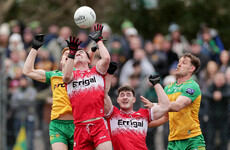ANDY FARRELL HAS strong foundations to build on as he takes over from Joe Schmidt as Ireland head coach, but he also has the burden of expectation.
Schmidt transformed Ireland from sometimes contenders into a consistent force in Test rugby, sweeping to a series of historic firsts before his reign ended with the dejection of failure to deliver at this World Cup in Japan.
So as Farrell takes over – becoming the top dog for the first time in his coaching career – Irish rugby expects this Ireland team to remain the competitive beast of recent years, as well as driving on to the improvement that is clearly necessary to finally get beyond the quarter-final stage at the 2023 World Cup.
44-year-old Farrell will be very hopeful of getting off to a strong start in 14 weeks’ time as the Six Nations kicks off at home to Scotland. A slow opening championship would only add to the dejection caused by this World Cup in Japan, and might even lead to early question marks over his appointment.
Importantly, Farrell has plenty of quality to work with as the new era begins.
Captain Rory Best is the only player definitely retiring in the wake of this tournament, with other veterans like 34-year-old Johnny Sexton and 33-year-old fullback Rob Kearney having stated their intentions to continue playing.
There will be calls for Farrell to immediately rip up the script and begin the process of building towards 2023 by blooding younger players into the starting team but the new boss has to consider that Six Nations success is a crucial lifeblood for the IRFU.
Squad stalwarts like CJ Stander – who had an excellent World Cup – Iain Henderson, Peter O’Mahony, Conor Murray, and Bundee Aki are sure to have big parts to play moving forward. It’s a shame for Farrell that Jack Conan will miss the Six Nations next year after undergoing foot surgery last week.
However, Farrell will also feel he has key elements already in place as he glances four years down the line.
Second row James Ryan is already one of the best players in the world and it would be a shock if he was not Ireland captain by the 2023 competition. The temptation might be to make him the official leader sooner rather than later, but captaincy would be a major burden on a young man who is still learning and finding his voice.
In current vice-captains Sexton and O’Mahony, Farrell has ready-made leaders who could step into Best’s shoes if selected.
Around Ryan, there is a core of high-quality young players who look like being key figures in 2023. Garry Ringrose will be 28 that year. Joey Carbery, Andrew Porter, and Jacob Stockdale will be 27. Jordan Larmour will be just 26.
The likes of Robbie Henshaw, Chris Farrell, Tadhg Furlong, Josh van der Flier and Luke McGrath will still only be 30 – meaning a large part of the squad that has tasted bitter disappointment in Japan could feature again in France in four years’ time.
Farrell will also be eyeing some of the exciting young talent in the Irish provinces including but not limited to Munster’s Fineen Wycherley, Shane Daly and Keynan Knox, Leinster’s Scott Penny, Max Deegan, Caelan Doris, Ryan Baird and Ronán Kelleher, Connacht’s Dylan Tierney-Martin and Paul Boyle, and Ulster’s Michael Lowry and James Hume.
There are many other youngsters with potential emerging around the country and though some won’t reach the heights of Test rugby, Farrell will have talent to work with.
He will see the blockbusting James Lowe qualify to play for Ireland next November, while Connacht captain Jarred Butler and Munster’s Chris Cloete also become eligible next year. Leinster’s Jamison Gibson-Park is already qualified, while Munster hooker Rhys Marshall comes on line from next month.
The IRFU should, of course, continue to work hard to grow the playing base in Ireland, particularly in areas of the country where rugby has not traditionally had a grip. Farrell won’t be likely to feel the benefits of any work in that regard but clearly there is more the union can do to improve the quality of players who end up at Test level.
The Englishman will have new support staff in attack specialist Mike Catt and scrum coach John Fogarty, while forwards coach Simon Easterby and skills/kicking coach Richie Murphy will provide further continuity alongside Farrell.
Fogarty will look to build on the superb job the departing Greg Feek has done with Ireland’s front row and scrummaging stocks, the Kiwi moving on after terrific service to Irish rugby since joining Leinster in 2010.
Fogarty has earned a strong reputation through his work with Leinster’s scrum since 2015 and is sure to be a popular figure with the Ireland players.
There will be huge focus on Catt, the South Africa-born former England international who joins after three years as Italy’s attack coach, having previously worked alongside Farrell with England up until the failed 2015 World Cup on home soil.
With Farrell’s coaching strengths revolving around defence, Catt is tasked with evolving Ireland’s attacking play – which faced repeated criticism for being one-dimensional during the Schmidt era.
Of course, Farrell’s philosophy around the game will feed into what Catt actually coaches and it will be fascinating to see how Ireland set up from next year onwards. 48-year-old Catt is regarded as tactically astute but it remains to be seen what impact he has.
“He was a smart and innovative player and he brings those attributes and much more besides in his approach to coaching and player development,” said IRFU performance director David Nucifora when the signing of Catt was confirmed in June.
The presence of Farrell at the top of the tree ensures continuity along with Easterby and Murphy, as well as most of this World Cup squad of players, but Ireland will be keen to make a point of 2020 being the start of something new and fresh.
They will try to learn the lessons of this World Cup and maintain some of those foundations Schmidt has put in place. With the likes of Ryan leading the charge on the pitch, it will be intriguing to see how Ireland follow up the Schmidt era.
Originally published at 14.30













That man Jordan at it again.
Brilliant result. The ref was very harsh on them in the first two games. Hopefully they take skin the ozzy’s